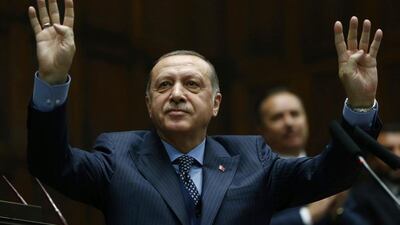How did the Iranian regime survive some of the economic sanctions brought against it by the United States? The answer to that question was revealed in a New York courtroom, where a Turkish banker was convicted this week for his part in a shocking conspiracy to help Tehran evade sanctions. Iran was able to circumvent the sanctions because it could obtain the cooperation of individuals with connections to the highest echelons of political power in Turkey. A complex financial plan was devised to enable Iran to "blow a billion-dollar hole" at the height of sanctions, thanks to oil profits held by Turkish banks.
Could such a venture have worked without the blessings of those who wield power in Turkey? The star witness for prosecution in the New York case testified that Turkish president Recep Tayyip Erdogan had personally ordered a pair of banks to take part in the scheme. Mr Erdogan vehemently denies this yet has gone out of his way to pressure the US to drop the case. The case as it unfolded did not, in the end, implicate him. But the outcome of the trial demonstrates that something is profoundly rotten in the unholy alliance Turkey has forged with the Iranian regime.
________________
Read more
Turkish banker found guilty of helping Iran evade sanctions
US national security adviser: Qatar and Turkey are new sponsors of radical ideology
Editorial: There is no room for colonialism in today's world
________________
Instead of using its relationship with Iran to demand greater accountability, Turkish financial institutions were milked to help the Iranian regime bypass international law. Some of those funds no doubt found their way into the pockets of Iran-backed militias causing chaos and bloodshed in Yemen, Syria and Lebanon, making Ankara a complicit partner in their murky dealings and seriously jeopardising its relationship with its Nato ally, the United States, in the process. The trial threatens the credibility of Turkey as a Nato partner interested in respecting and honouring the sovereignty of its Middle Eastern neighbours. Aiding and abetting Tehran when the latter is financing the destabilisation of the Middle East is shortsighted at best, and dangerously undermining of the region's efforts at maintaining peace and stability at worst.
Convicted banker Mehmet Hakan Atilla was described by his lawyer as a “hapless and helpless pawn” in a scheme orchestrated by people more powerful than he. While it is not clear how high up the ranks his deception went, it is blatantly apparent some of those in positions of responsibility and trust in Turkey seem to have adopted the Iranian regime's attitude to the law: that they are somehow above it. It is this contempt for international norms that fuelled Iran's quest to find ways to bypass the sanctions. The cash procured through this scheme was not spent on improving the lot of working-class Iranians, currently protesting austerity measures, but lined the pockets of those least deserving. The Iranian regime's desire to gain supremacy over the region by plunging it into turmoil is rivalled only by its indifference to the desperate needs of its citizens. That is why the sanctions, designed to weaken the regime, were so important – and why helping Iran's leadership to flout them was profoundly irresponsible and damaging. As the US attorney in the case said: "You can choose wilfully to help Iran and other sanctioned nations evade US law or you can choose to be part of the international banking community – but you can’t do both."
Follow The National's Opinion section on Twitter

